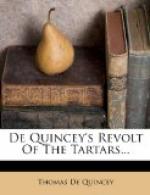Meantime war raged on a great scale between Russia and the Sultan; and, until the time arrived for throwing off their vassalage, it was necessary that Oubacha should 30 contribute his usual contingent of martial aid. Nay, it had unfortunately become prudent that he should contribute much more than his usual aid. Human experience gives ample evidence that in some mysterious and unaccountable way no great design is ever agitated, no matter how few or how faithful may be the participators, but that some presentiment—some dim misgiving—is kindled amongst those whom it is chiefly important to blind. And, however it might have happened, certain it 5 is that already, when as yet no syllable of the conspiracy had been breathed to any man whose very existence was not staked upon its concealment, nevertheless some vague and uneasy jealousy had arisen in the Russian Cabinet as to the future schemes of the Kalmuck Khan: and 10 very probable it is that, but for the war then raging, and the consequent prudence of conciliating a very important vassal, or, at least, of abstaining from what would powerfully alienate him, even at that moment such measures would have been adopted as must forever have intercepted 15 the Kalmuck schemes. Slight as were the jealousies of the Imperial Court, they had not escaped the Machiavelian eyes of Zebek and the Lama. And under their guidance, Oubacha, bending to the circumstances of the moment, and meeting the jealousy of the Russian 20 Court with a policy corresponding to their own, strove by unusual zeal to efface the Czarina’s unfavorable impressions. He enlarged the scale of his contributions, and that so prodigiously that he absolutely carried to headquarters a force of 35,000 cavalry, fully equipped: some 25 go further, and rate the amount beyond 40,000; but the smaller estimate is, at all events, within the truth.




